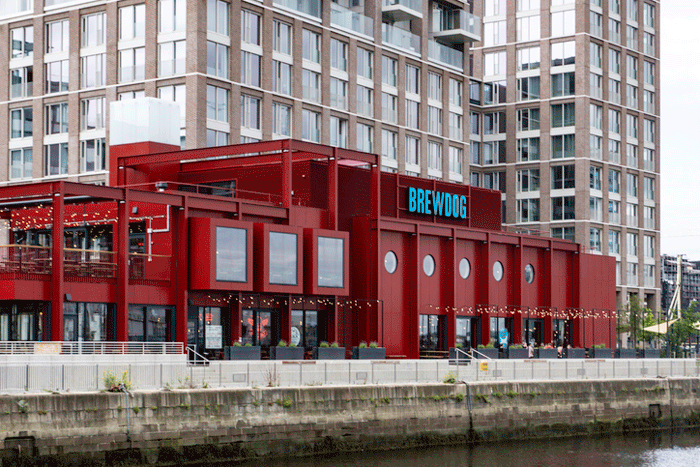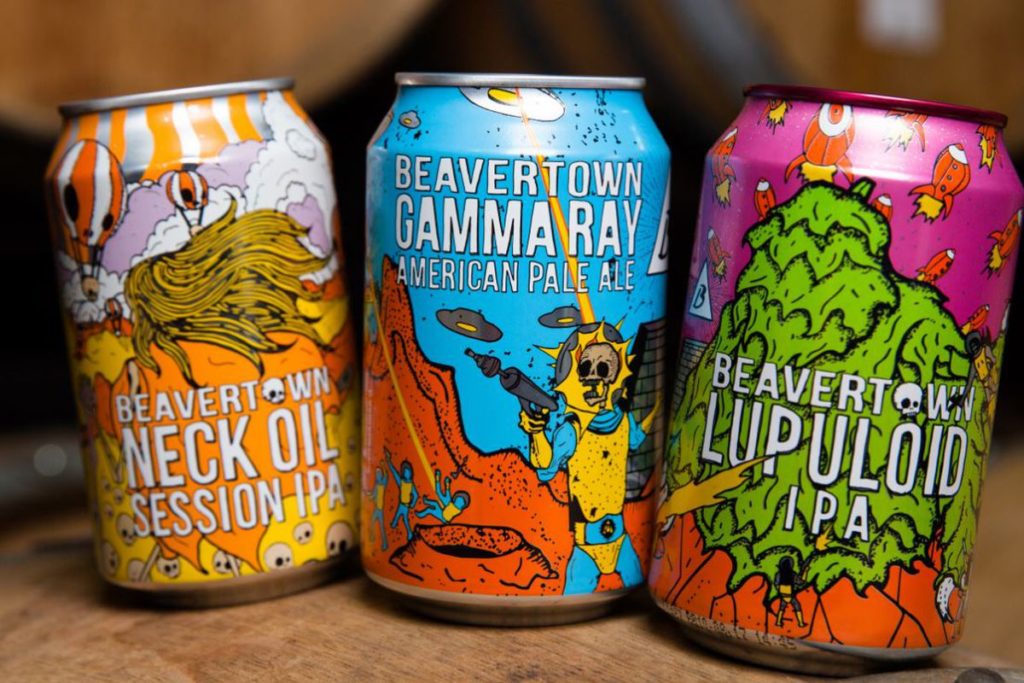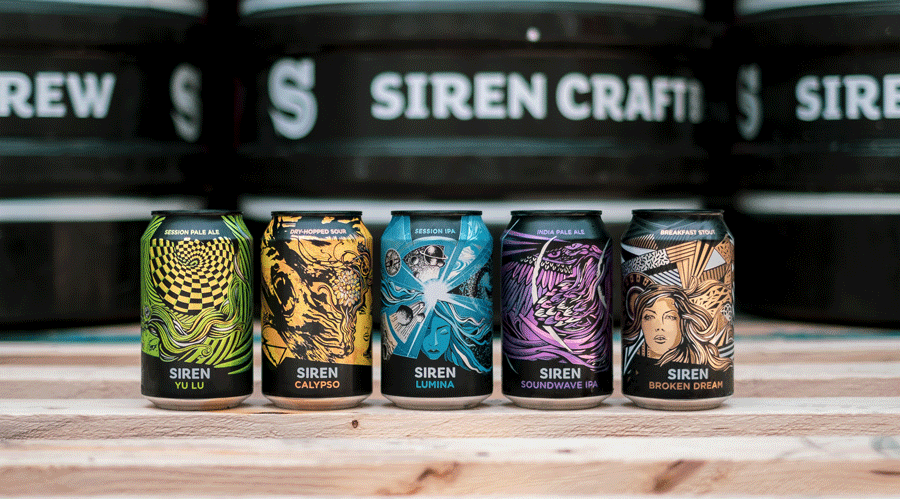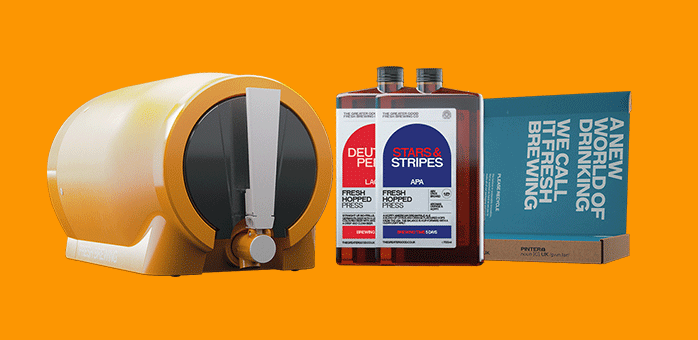UK Craft Beer Startups Raising the Bar
Category: Uncategorized
The British beer scene is a fast-growing subset of the food and drinks industry, driven by passionate founders and teams, for whom brewing beer is a true labour of love. The craze for innovative and specialty beer styles first took off in the late 2000s, and has since built a community of hardcore fans who are eager to put their money where their beer is—with over a third of the UK’s high-growth craft breweries tapping into crowdfunding. Owing to its typically bold and eye-catching designs, craft beer is pretty difficult to ignore, even if you don’t know your New England UPA from your fruited Saison.
In this article, we take a closer look at the biggest players in the craft beer space, plus some of the more niche breweries who are at the forefront of innovation. To make it into our analysis, a company has to have met at least one of our eight tracking triggers, have been founded since 2000, be registered in the UK, and be producing its own brand of beer. We currently track 122 such companies, the vast majority (87%) of which have grown using equity finance.
Some of these businesses operate purely as drinks manufacturers, whilst others have established taprooms and subscription services in order to distribute their thirst-quenching products. So, without further ado, let’s hop in…
Key Developments for UK Craft Breweries
Craft breweries have been attracting investor attention for over ten years, but particularly in the latter half of the 2010s. Just two deals, worth £2.40m, were announced in 2011, compared to 23 deals, worth £87.8m, in 2018. The total value of announced investments peaked in 2017, at £238m, across 14 deals. This was primarily driven by BrewDog’s £213m round in April 2017, backed by American private equity firm TSG Consumer Partners. The round was completed at a pre-money valuation of £829m, marking BrewDog’s induction into the UK’s unicorn club.
Since 2018, equity investment into UK breweries has slowed slightly, with just 16 investments, worth £8.32m, announced in 2020.
Another key factor in the changing landscape of craft beer is the coronavirus pandemic, and the government restrictions that came into play in March 2020. Not only were bars, pubs and taprooms forced to close for many months at a time between March 2020 and April 2021, but research shows that at-home drinking also declined for the average person in England and Scotland.
Fluctuations in demand will also be heavily dependent on each brewery’s distribution model. Companies that operate predominantly out of taprooms and bars will no doubt have suffered more than those that partner with major stores (which stayed open for the duration of the pandemic), and have their own e-commerce channels.
And for some, the pandemic represented an opportunity for innovation and brand building. In response to the national shortage in hand sanitiser, for instance, BrewDog began producing their own at their Aberdeen distillery, whilst Beavertown launched a ‘digital pub night’ for those missing ‘cheersing’ with friends.
Key Players in the Craft Beer Industry
The most famous of all craft breweries, BrewDog, was established in 2007 and has since set the gold standard for rebellious challenger brands. Now one of the largest UK beer companies, BrewDog started out with its notorious Punk IPA and Tokyo, the strongest beer available in the country. The company now produces seven core beers and up to 100 small batch brews each year, from Lost Lager and fruity Hazy Jane IPA to Layer Cake stout and Zeppelin Commute wheat beer.
BrewDog opened its first bar in 2010, located in its home town of Aberdeen, and now has over 100 worldwide. The company has also launched BrewDog Kennels, pint-sized hostels above its own bars, as well as Dog Desk which allows remote employees to book spaces to work from their bars (with unlimited coffee!), and Beer School, a two-hour session with an expert on the history of beer and different brewing methods. Hardcore fans can even apply for a Beer Visa, and collect unique stamps at each of BrewDog’s locations.
The company launched its own crowdfunding mechanism, ‘Equity for Punks’, back in 2009. It’s since raised 10 funding rounds, totalling more than £75m, which involved participation from over 200k people (some via Crowdcube). A further four funding rounds were backed by TSG Consumer Partners and other, undisclosed investors, taking BrewDog’s total investment to £298m. This makes it one of the best-funded businesses in the UK, and the second-most-funded company by the crowd, behind challenger bank Monzo (not to be confused with Mondo Brewing Company).

Speaking on their success with crowdfunding and the influence that it’s had on their business, a BrewDog spokesperson told us that “crowdfunding has truly been transformative for our business, giving us much-needed investment for turbo-charged growth internationally, as well as an engaged community that is with us every step of the way. Their feedback, support and engagement help us to refine our range, introduce new people to our beers, and test out new ideas before unleashing them on the world.”
As a leader in the industry, BrewDog has established its own definition for what it means to be a craft brewer. This includes:
Size – A craft brewery has to be small, brewing less than 500k hectoliters, annually.
Authenticity – A craft brewery should not use any “adjuncts” to lessen flavour or reduce costs.
Honesty – All ingredients should be clearly listed on the beer’s label, alongside the place it was brewed.
Independence – Craft breweries should not be more than 20% owned by a non-craft brewery company.
And it’s safe to say that BrewDog sticks to its word, especially when it comes to independence. In 2015, BrewDog Co-Founder James Watt announced that it would no longer be selling Camden Town Brewery Beers, following the company’s acquisition by global brewing giant AB InBev. Later, in 2018, Watt also announced the removal of Beavertown beers from its bars, following a £40m investment from Heineken.
We will no longer be selling any @CamdenBrewery in our bars. We don't stock @ABInBevNews beers.
— James Watt (@BrewDogJames) December 21, 2015
We will no longer be selling Beavertown beers or attending Beaver Ex. I wrote this piece in 2015 but it seems very relevant today too https://t.co/36Jn93MRI3
— James Watt (@BrewDogJames) June 21, 2018
Although no longer on the best of terms with BrewDog, Beavertown has crafted its own success story, reporting a turnover of £35.3m and an operating profit of £1.31m in 2020. Cased in galactic artwork, Beavertown beers were first brewed in the kitchen of its founder, Logan Plant, and barrelled into the market in 2011, from the comfort of his local pub, Duke’s Brew and Qu.
A decade of mashing and sparging later, Beavertown now sells six core beers, including its Neck Oil session IPA and Gamma Ray American Pale Ale, as well as various limited edition brews, glasses, barware and apparel. Distributors include Tesco, Sainsbury’s and Waitrose.
Berkshire-based Siren Craft Brew is another stout player in the space. Established in 2013, the brewery’s name references the sirens of Greek mythology, and was inspired by craft beer’s irresistible call to the company’s founder, Darron Ansley. Its name is reflected in the brewery’s bright artwork and packaging, with a long list of flavours aiming to appeal to everyone.
To date, Siren Craft Brew has a number of awards under its belt, including Best Brewer in England 2015, and Supreme Champion Beer of Britain 2018. It also appeared on ConnectTVT’s Game Changers list in 2018 and 2020. Following in BrewDog’s footsteps, the company secured a £1.22m equity round from crowdfunding platform Crowdcube in 2018.
Other notable breweries in the UK’s high-growth ecosystem include Somerset-based Wild Beer which prides itself on “alternative fermentations, unorthodox yeasts, and seasonally-foraged ingredients”, and has raised three rounds of funding, totalling £3.46m. Meanwhile, Leeds-based Northern Monk Brew Co combines traditional monastic brewing with a modern approach to ingredients, and has so far raised three rounds of funding, worth £5.65m, via Crowdcube and Active Partners.
Niche Entrants to the Craft Beer Market
Gluten-free options
Given that traditional beers are brewed using malted barley and hops, and often include wheat, most craft beers are not gluten-free. Based in Edinburgh, Bellfield Brewery is on a mission to make sure that everyone can enjoy a crispy cold one with their friends, with a wide range of IPAs, ales, pilsners and more—all of which are certified by Coeliac UK and Registered with the Vegan Society. Bellfield has so far secured six funding rounds, worth a combined £1.54m, with backing from Crowdcube, Scottish Enterprise, and Equity Gap.
Low-alcohol and alcohol-free
Others, such as Loah and Freestar Drinks, are producing low-alcohol or alcohol-free options, bridging the gap between the soft drinks and alcoholic beverages market, and providing a plethora of options for people who drink for the taste, rather than the buzz (or simply refuse to give up beer during Dry January). Both these businesses are still very young, with Freestar incorporated in 2019 and Loah in the summer of 2020, having raised £1m and £207k, respectively.
Similarly, Genius Brewing is a health-focused brewery which produces low alcohol by volume (ABV) beers, as well as low-calorie options. Its Gen!us Craft Lager is 3% ABV and contains fewer calories than an apple. Founded in Glasgow in 2016, the company is now in the Venture stage of evolution, with £597k of funding under its belt. In April 2021, founders Charles Craig and Jason Clarke appeared on Dragon’s Den, where they declined investment from Tej Lalvani.
Infusions
Aiming for a new market of CBD enthusiasts, Lancaster-based Cannabrew infuses each of its beers with high quality cannabinoids, and recently secured a £222k equity round via Seedrs. In London, skate and beer brand Hop King is also experimenting with its own CBD Pale Ale, citing potential health benefits, such as reducing anxiety and inflammation, and improving mood. The company also runs an indoor bar and skate park, and has secured £250k via Crowdcube.
Meanwhile, The Spirit Beer Company is brewing beers infused with spirits from all over the globe, from Havana Rum to Apple Schnapps and Italian Almond Liqueur. The company was incorporated in Yorkshire in 2016, and has so far raised one funding round, worth £2.52m. Investors remain undisclosed, but from their ownership filings, it looks to be predominantly an angel, friends and family round.
For the home brewer
Pinter produces at-home brewing kits, allowing consumers to create their own craft beers. Starter kits contain hand-crafted Fresh Presses, containing hops, malt and fruits—ready malted, kilned, milled and mashed—as well as brewing yeast, and a ‘pinter’ where the beer is brewed. It has capacity for up to ten pints of beer and typically takes around four days to brew, creating and retaining its own CO2.
The company was founded in 2010 by Ralph Broadbent (MD) and Alex Dixon (New Product Development Director), with Evangelos Tsionos now working as Head Brewer. The brewing company now employs over 50 people and has secured £1.68m of investment.
Brewing for good
Tap Social Movement employs people currently serving and recently released from prison sentences, supporting them to develop new skills and obtain work experience. It stocks five varieties of Criminally Good beer, as well as mixed cases.
Its founders all share a passion for social justice, and each have experience with a different aspect of the justice system: Paul Humpherson is an independent criminal barrister; Amy Taylor has a DPhil in Criminology from the University of Oxford, and Tess Taylor is a Bachelor of Commerce grad with craft beer bar and retail management experience.
Since launching in 2016, the company has grown a successful brewery (now with two locations) and supported ex-offenders to full-time employment. In 2019, it officially launched its Jobs on Tap charity, an employment brokering service which connects ex-offenders with other inclusive employers in the hospitality industry. Tap Social is sponsored by Oxford’s OxLep, Oxfordshire Leader Funding, and the Forward Enterprise Fund, among others.
Supporting Acts to Craft Brewers
Alongside innovative breweries, there are also a number of high-growth businesses that are helping to connect the craft beer community and deliver world-class brews to all corners of the country.
One such company is We Are Beer, which promotes new craft beers and smaller breweries through festivals. The equity-backed company’s first event was the London Craft Beer Festival in 2013, which proved to be a great success and was soon followed by festivals in Bristol, Edinburgh, and Manchester. According to its website, the company is currently collaborating with a number of breweries to create unique beers. Its next festival, Beer Central, is due to take place from 2nd-3rd July in Birmingham.
Meanwhile, Beer52 runs a subscription-based craft beer club, delivering beer from various microbreweries to its members. Subscribers receive a box of eight ‘discovery beers’ from a new country each month, along with a magazine and a snack, and can rate and review beers to earn rewards. The company was spun out from the University of Dundee in 2013, and attended the Entrepreneurial Spark accelerator programme in 2015. Like many of the breweries it supports, it has also raised money via the crowd, securing £100k from Angels Den Crowdfunding in 2014, and has since secured a further £2.42m from NatWest and Scottish EDGE, amongst others.
Other high-growth distributors of craft beer include Essex-based Hoppily, Islington-based Honest Brew, and BeerBods which was acquired by AB InBev in 2019—so there’s plenty of places to source your next hand-crafted beverage.
Discover the UK's most innovative companies.
Get access to unrivalled data on all the businesses you need to know about, so you can approach the right leads, at the right time.
Book a 40 minute demo to see all the key features of the Beauhurst platform, plus the depth and breadth of data available.
An associate will work with you to build a sophisticated search, returning a dynamic list of organisations matching your ideal client.


